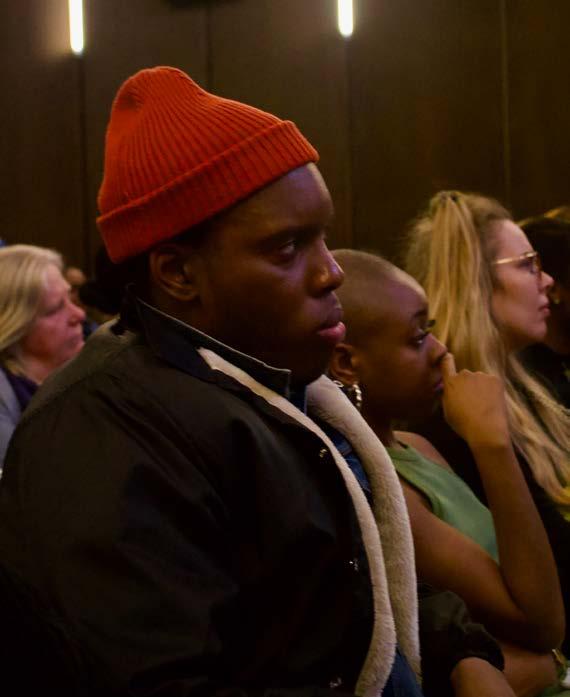
3 minute read
Being a Black man.

Being a Black man
Advertisement
KERIAN PREDDIE, BA CULTURE, CRITICISM AND CURATION, UAL.
Our society is shaped by the constructed biases that help enforce a profitable royalist/capitalist agenda. The insidious social and polemical norm setting help maintain systematic control by targeting particular groups based on ethnicity, gender and class. In this essay I will analyse some of the underlying effects of constructed negative media representation of black men throughout society.
As a young black male of a diaspora, my heritage, and consequent self-determined values are at friction against the domination and ubiquity of white-centered capitalism. My life is confined by both subjective and subjugating discourses that have personal and societal consequences largely outside my control. These ubiquitous, interwoven biases underlie all areas of human activity, and are illuminated to me by the slightest shifting of my lens. The value of my race and heritage battles with the impact of media misrepresentation, and the resulting public anxiety. It is a narrative representation that supplants my individuality and history with prevalent negative perceptions of illiteracy, hyper-sexuality, and deviancy regardless of my education and social positioning - “longstanding legacies that may take generations to shift.” (The Opportunity Agenda, 2011)
The 2011 study conducted by The Opportunity Agenda on Media Representations and Impact on the Lives of Black Men and Boys, presents this as a “Core problem”. One that creates “A troubling link between media portrayals and lowered life chances for black males.” (The Opportunity Agenda, 2011). Comments such as, “Do you know have any gear” or the term “young progressive black man” are just a few coded examples of language directly and indirectly informed by distorted media representation.
Both of these examples largely define my experiences outside and on occasion, inside my own community. These pre-determined and reaffirmed prejudicial representations continue to isolate blacks, and black men in particular, repositioning us to a place of constant vulnerability and persecution where upward mobility is made is extremely difficult. Negative representation is prevalent in mainstream media, despite the occasional T.V. or media respite, whereby a “positive”, more socially acceptable narrative or protagonist is introduced.
Positive coverage of ‘respectable’ black males are predominantly all entertainers. Individuals who’s exceptionalities are in sports, music, or dance. But even with their talents and elevated position within society, black entertainers are subject to the same institutional racial biases. This phenomena is particularly present within the film industry, black actors have historically played lesser roles, and often been the vehicles to transport media messages of deviancy. Also, the most prevalent roles often reflect “limited life choices”. When was the last time you have seen a black college professor, doctor, lawyer or scientist selling a product?” (Donaldson, 2015). These fractured perspectives continue to impact our individual potential and collective progress. The study also claims:
The Opportunity Agenda, 2011
It is my contention that to drastically reframe these dialogues and change the perception of black men in society, black people need to assume greater influence by owning and controlling media and production houses. Our societal perceptions are dominated by the visual representations of media and, I believe, it is only through possession and reconstruction of our image as black people that we can ensure our future development, happiness, and mobility as a group.
My journey from the working-world back into academia and the creative industry has widened my perspective. Although initially unnerving, and intimidating, the freedom with which I now express myself reflects the realisation that as a ‘black man’ I can not be defined by the prevalent norms society presses upon me. I have learned to embrace the provocation of prevalent norms and separate myself from the biased, standards of others; accepting that these misconceptions are part of my journey. Yet, I will neither be defined by those norms nor accept that my race is responsible for their creation.
Further Reading:
The Opportunity Journal (2011, October). Media Representations and Impact on the Lives of Black Men and Boys. Retrievable at: www.racialequitytools.org/resourcefiles/ Media-Impact-onLives-of-Black-Menand-Boys-OppAgenda.pdf (P. 13)
The Opportunity Journal (2011, October). Media Representations and Impact on the Lives of Black Men and Boys. Retrieved at: www.racialequitytools.org/resourcefiles/ Media-Impact-onLives-of-Black-Menand-Boys-OppAgenda.pdf (P. 13)
The Opportunity Journal (2011, October). Media Representations and Impact on the Lives of Black Men and Boys. Retrieved from: www.racialequitytools.org/ resourcefiles/Media-Impact-onLives-of-BlackMen-and-Boys-OppAgenda.pdf (P. 15)
Donaldson, L. (2015, August 12). When the media misrepresents black men, the effects are felt in the real world. www. theguardian.com/commentisfree/2015/ aug/12/media-misrepresents-blackmen-effects-felt-real-world









